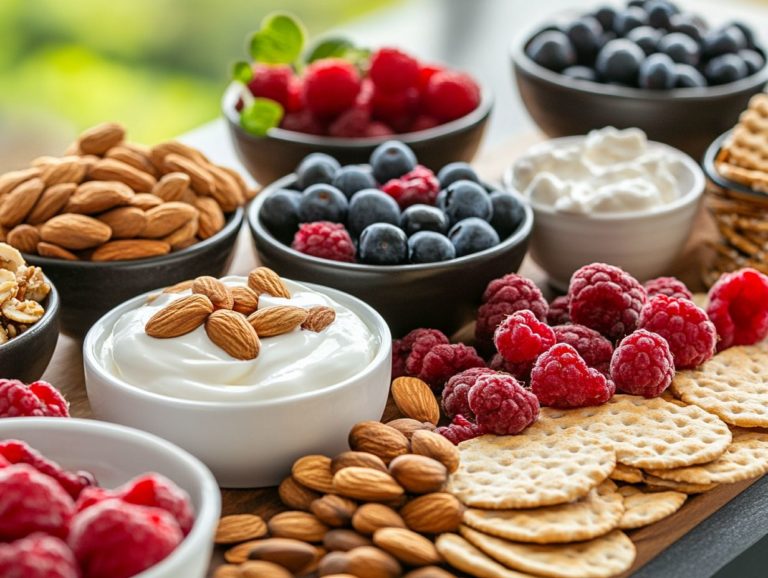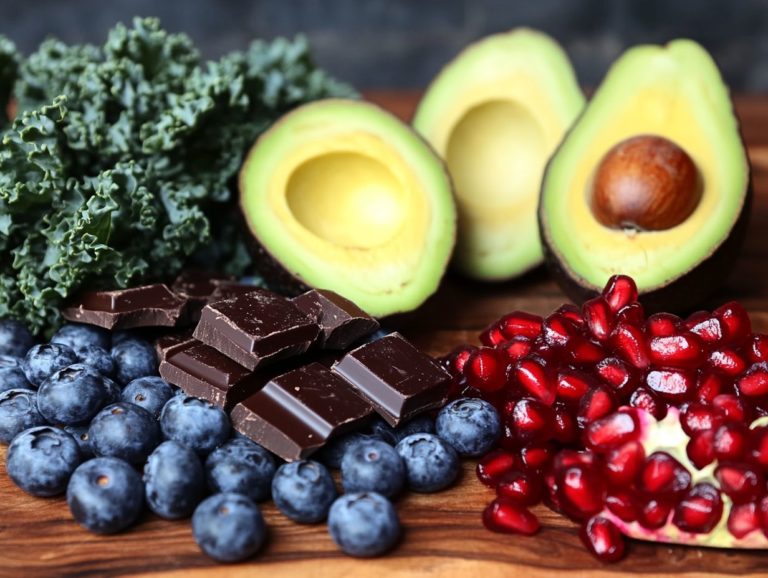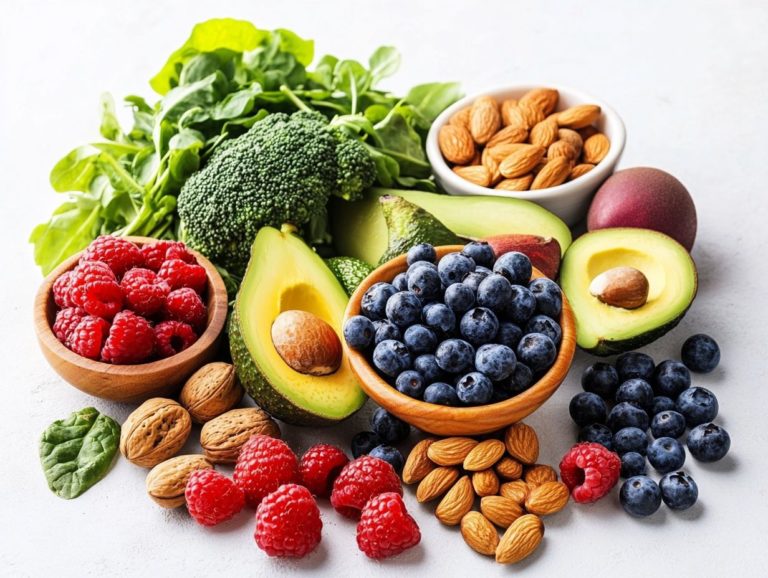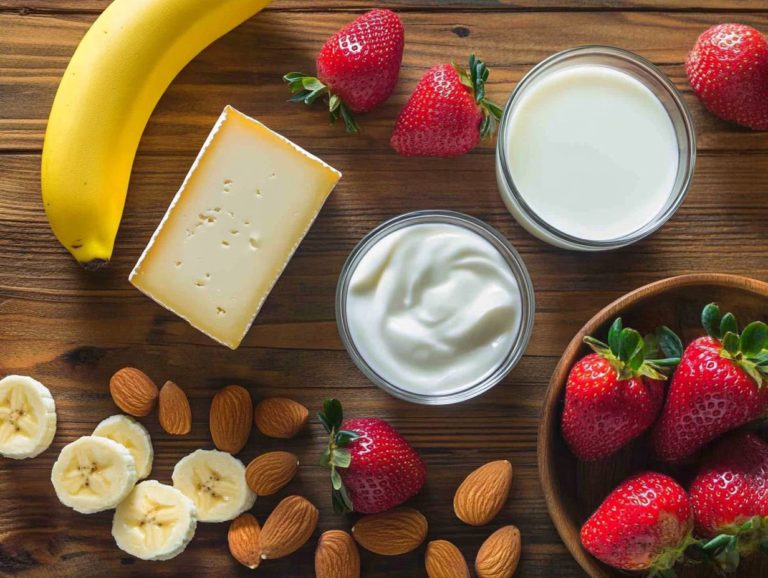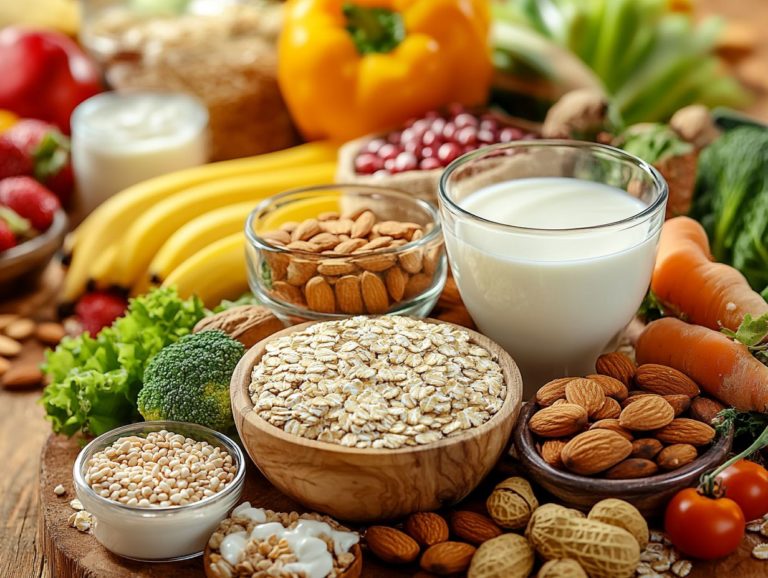The Best Sources of Nutrients for Athletes
Athletes push their bodies to the limit. To perform at their best, you need to fuel yourself with the right nutrients.
Carbohydrates deliver energy for intense workouts, while proteins aid in building and repairing muscles. Understanding these essential elements is crucial for your success.
Healthy fats are not just a luxury; they play a key role in endurance and recovery. Vitamins and minerals ensure your body functions at its peak.
Hydration is equally vital and impacts your overall performance in ways you might not realize.
Discover the best sources of nutrients that will supercharge your training and elevate your performance!
Contents
Key Takeaways:
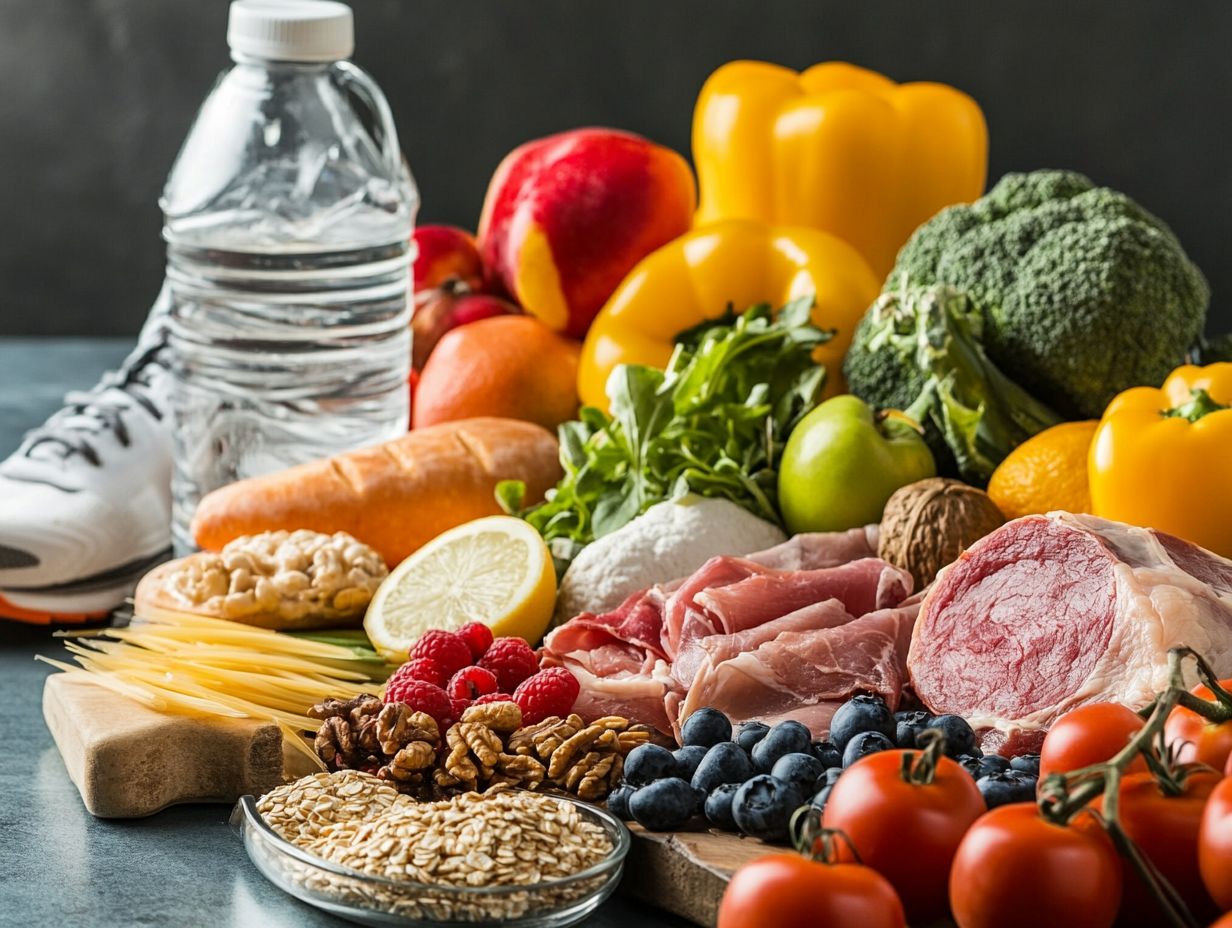
- Carbohydrates fuel your training and competitions.
- Protein helps you recover faster, so you can perform at your best.
- Choose healthy fats like avocados and nuts for endurance.
Nutrient Needs for Athletes
Understanding your nutrient needs as an athlete is vital for optimizing performance. Take a complete approach to nutrition, recovery, and energy management.
Ensure you re getting essential nutrients like carbohydrates, proteins, and fats. Don t forget the vital vitamins and minerals that support your training, stamina, and agility.
Tailoring your nutrition to meet your athletic training demands can enhance muscle recovery, improve hydration, and promote optimal growth.
Seeking guidance from experts like registered dietitians, such as Dr. Ann Brown from the University of Idaho’s Human Performance Laboratory, can help you navigate meal planning and dietary choices that fit your energy needs.
Understanding the Demands of Athletic Training
Athletic training involves understanding many factors that affect your performance, especially when it comes to exercise regimens designed to boost stamina and agility in young athletes gearing up for high-intensity competitions.
The physical demands of these sports call for a structured training program that builds strength and prepares you mentally and physically for upcoming challenges.
Incorporating targeted exercises such as plyometrics, circuit training, and sport-specific drills can significantly enhance your performance. Establish a balanced training schedule that includes endurance, strength, and skill-focused sessions.
Effective rest days are crucial. Active recovery techniques help prevent injuries and foster muscle growth.
Nutrition is the fuel that powers your training. Ensure your body gets the right balance of nutrients to support rigorous activity, ultimately improving both resilience and performance outcomes.
Carbohydrates for Energy
Carbohydrates are your primary energy source! They play an essential role in elevating your performance during athletic training and high-intensity exercises that require quick energy bursts.
By incorporating whole grains, fruits, and performance-enhancing snacks into your diet, you can maintain optimal caloric intake. This approach helps you meet your energy needs and sustain your competitive edge throughout your training regimen.
The Role of Carbs in Athletic Performance
The importance of carbohydrates in athletic performance cannot be overstated. Carbs provide the energy needed to power through intense workouts and competitions, helping you recover quickly and achieve better results.
When you consume the right amount of carbohydrates, you maintain higher levels of exertion and optimize your recovery process. Through the process your body uses to convert carbs into energy, your body breaks down carbohydrates into glucose, fueling your muscle cells and significantly enhancing endurance while delaying fatigue.
As an athlete, your recommended carbohydrate intake can vary. Endurance athletes may require up to 10 grams per kilogram of body weight, whereas those engaged in shorter, high-intensity sports may benefit from lower amounts.
By tailoring your carbohydrate consumption to your training routines and competition schedules, you maximize your performance and accelerate post-activity recovery. This approach helps you maintain peak physical condition and perform at your best.
Protein for Muscle Building and Repair

Protein is a key nutrient every athlete needs, playing a crucial role in muscle building and repair. It is essential for recovery after workouts and training sessions.
Ensure you consume adequate protein from lean meats or plant-based options to provide your body with the essential amino acids needed to support muscle growth and enhance performance.
To elevate your athletic journey, prioritize protein as a fundamental element of your diet.
How Protein Supports Athletic Training
Protein is vital for athletic training, facilitating muscle repair and growth. It boosts your performance as you push your physical limits during intense workouts.
Timing your protein intake is key; consuming it shortly after exercise can significantly enhance muscle recovery. This ensures your body has the necessary building blocks to rebuild damaged tissues.
Incorporate high-quality protein sources, such as lean meats, dairy, and plant-based options like legumes and quinoa, for the best results.
Integrating these protein-rich foods into your post-workout meals not only aids in muscle development but also supports your energy levels, enhancing performance in subsequent training sessions.
Fats for Endurance and Recovery
Healthy fats are critical for boosting your endurance and speeding up recovery as an athlete. They provide a concentrated source of energy that becomes invaluable during prolonged exercise and high-intensity training sessions.
Incorporating healthy dietary fats like avocados, nuts, and fish into your meals helps sustain your energy levels and plays a vital role in your recovery process, ensuring peak performance when it matters most.
The Importance of Healthy Fats for Athletes
The significance of healthy fats for athletes is essential. These fats boost endurance, aid recovery, and maintain overall health during training.
They supply vital fatty acids that contribute to your energy reserves and are crucial for hormone production, positively influencing performance. For example, the omega-3 fatty acids found in salmon help reduce inflammation and promote heart health, which is vital for sustaining long-term physical activity.
Make these foods a regular part of your diet for maximum performance! Foods like avocados, nuts, seeds, and fatty fish can greatly enhance your nutritional intake. A handful of almonds after a workout or a delicious avocado spread on whole-grain toast can elevate your post-exercise experience.
Drizzling olive oil over your cooking or salads adds flavor and delivers significant health benefits, ensuring your energy levels and recovery processes remain optimal.
In conclusion, the right balance of carbohydrates, proteins, and healthy fats is crucial for athletes aiming to maximize performance, enhance recovery, and maintain overall health. Embrace these nutrients as essential tools in your athletic journey!
Vitamins and Minerals for Optimal Functioning
Vitamins and minerals are vital for your performance as an athlete. They play a crucial role in many physiological processes that enhance your abilities, aid in recovery, and promote overall health.
Having enough of these small nutrients is essential for maintaining energy levels, supporting metabolic functions, and promoting effective hydration during intense training sessions and competitions.
Key Nutrients for Athletic Performance
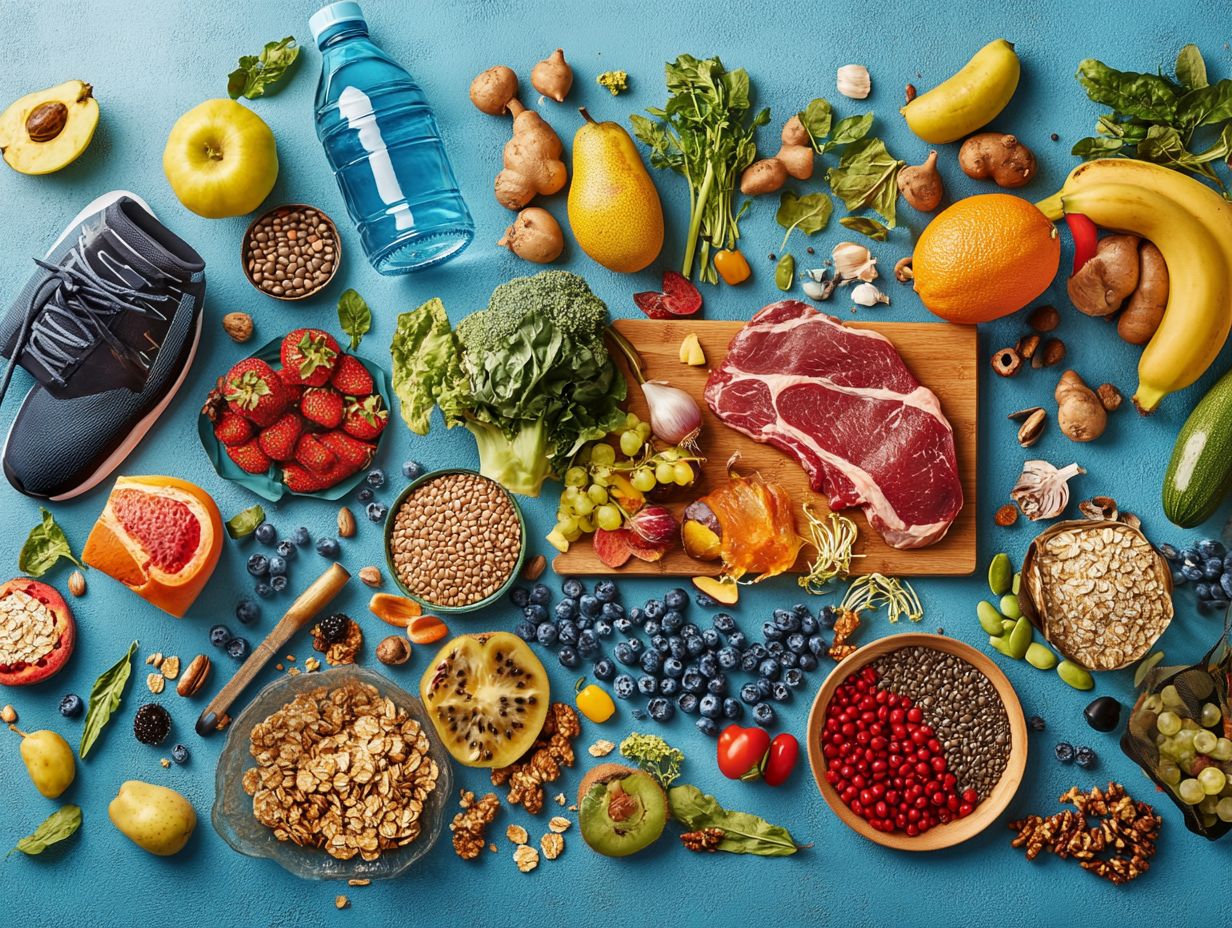
Key nutrients like vitamins and minerals elevate athletic performance by supporting energy metabolism, hydration, and overall health. When you prioritize these nutrients, you empower your body to perform at its peak.
They are crucial for muscle contraction, immune health, and recovery, making them essential components of your diet.
Take B vitamins, for example they’re vital for energy production, helping convert carbohydrates into usable fuel. Vitamin C is your ally for repairing tissues and reducing oxidative stress from exercise. Don’t overlook vitamin D; it’s fundamental for bone health and muscle function during recovery periods.
On the mineral front, calcium is critical for muscle contractions and maintaining bone strength. Iron is essential for oxygen transport in your blood, which is key for endurance.
You can strike the right balance of these nutrients with a well-rounded diet rich in fruits, vegetables, whole grains, and lean proteins, ensuring you meet your unique nutritional needs as an athlete.
Hydration for Athletic Performance
Hydration is crucial for your athletic performance. It directly impacts your ability to excel, recover, and maintain optimal health during both training and competitions.
Consuming enough fluids wards off dehydration and boosts your endurance, stamina, and overall effectiveness. Make hydration a top priority to enhance your performance!
Importance of Staying Hydrated During Training
Staying hydrated during training is essential for maintaining peak performance and ensuring effective recovery. Even mild dehydration can hinder your abilities and increase the risk of injuries.
Proper hydration allows you to sustain energy levels and stamina throughout intense training sessions.
To achieve this, adopt specific hydration strategies tailored to your training type. For endurance athletes, electrolyte-rich drinks can help replenish lost minerals during lengthy activities. If strength training is your focus, balanced hydration can help you avoid cramping.
Being aware of the signs of dehydration like fatigue, dizziness, or dark urine can greatly impact your performance. By prioritizing your fluid intake before, during, and after workouts, you can optimize recovery and enhance your training effectiveness.
Watch this video to discover essential tips for maximizing your training!
Frequently Asked Questions
What are the best sources of nutrients for athletes?
The best sources of nutrients for athletes include lean proteins, complex carbohydrates, healthy fats, fruits, vegetables, and adequate hydration. Consider incorporating supplements like protein powder, BCAAs, and electrolytes into your diet.
Why are lean proteins important for athletes?
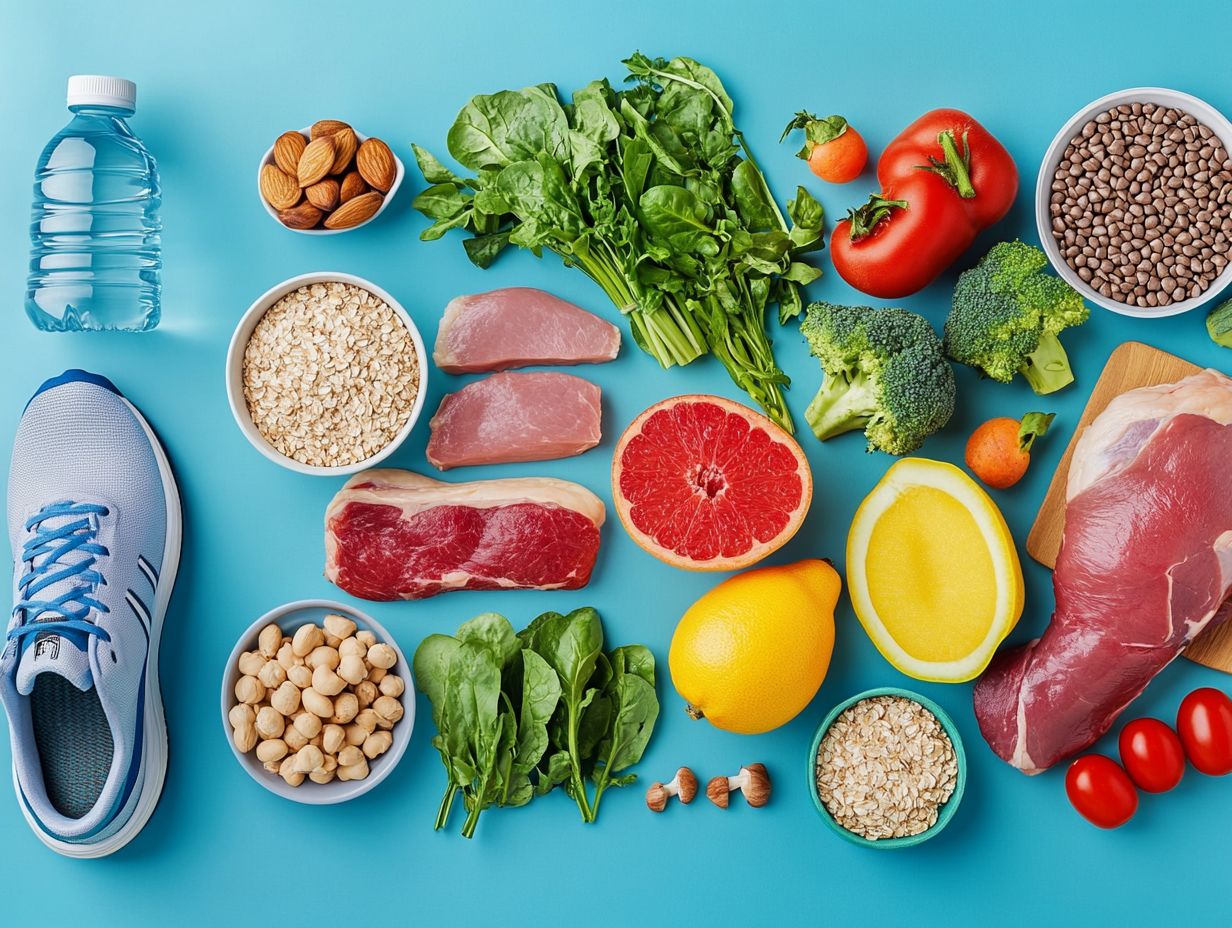
Lean proteins are essential because they provide amino acids for muscle repair and recovery. They also help build and maintain lean muscle mass, crucial for strength and performance.
What are the best sources of complex carbohydrates for athletes?
Some of the best sources of complex carbohydrates for athletes include whole grains like brown rice, quinoa, and oats, as well as starchy vegetables like sweet potatoes and corn. These carbohydrates provide sustained energy for long workouts and help replenish glycogen stores after exercise.
How Important Are Healthy Fats for Athletes?
Healthy fats are crucial for athletes. They provide energy, support hormone production, and help absorb important vitamins.
Great sources of healthy fats include avocados, nuts, seeds, olive oil, and fatty fish like salmon.
Why Prioritize Fruits and Vegetables?
Fruits and vegetables are packed with vitamins, minerals, and antioxidants. These nutrients boost overall health and improve athletic performance.
They also contain fiber, which aids digestion and keeps you feeling full.
Do Athletes Need More Water?
Yes! Athletes lose more fluid through sweat during exercise, so they must drink more water. Aim for at least half your body weight in ounces of water daily.
Drink even more during intense training or in hot weather to stay energized!


